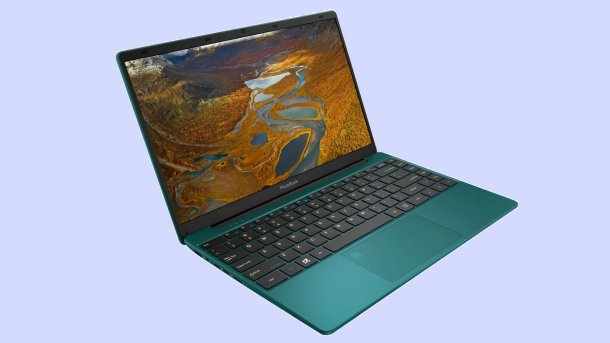Eight RISC-V cores: notebook and single-board computer with Keystone K1 CPU
The "MuseBook" and the Banana Pi BPI-F3 are equipped with the SpacemiT Keystone K1, whose RISC-V cores are designed to outperform the ARM Cortex-A55.

RISC-V-Notebook SpacemiT MuseBook mit Keystone X1
(Bild: SpacemiT)
Around a year after the StarFive JH7110, another RISC-V chip from China is entering the race: The SpacemiT Keystone K1. SpacemiT combines eight CPU cores of the apparently self-developed X-Core X60 type with an AI accelerator, the Imagination IMG BXE-2-32 graphics processor and numerous other controllers, including for USB 3.0 (USB 3.2 Gen 1), USB 2.0, PCI Express, Ethernet, SPI, SDIO and I2C.
According to SpacemiT, the X60 core should calculate around 30 percent faster than an ARM Cortex-A55. The latter was announced in 2017, and the Rockchip RK3566 contains four of them. However, SpacemiT has not yet revealed the clock frequency at which the K1 runs.
Unlike the StarFive JH7110 mentioned at the beginning, which sits on the StarFive VisionFive2 single-board computer, the SpacemiT X60 has a 256-bit vector extension according to the RV22 specification. It could provide higher floating point computing performance.
SpacemiT itself has also published data on a 14-inch notebook equipped with the K1: the MuseBook. It will be launched on the market in variants with 4, 8 and 16 GB of LPDDR4X RAM. The 16:9 display shows full HD resolution, and the operating system will be "Bianbu OS" in addition to RISC-V versions of Ubuntu and other Linux distributions.
As a special feature, the MuseBook has a GPIO connection with eight contacts, which makes it more suitable for developers.
SpacemiT has not yet revealed when and at what price the MuseBook will be available.
Banana Pi BPI-F3 with K1
(Bild: Banana Pi)
A few months ago, Banana Pi announced the BPI-F3 single-board computer, also with SpacemiT Keystone K1. The price and delivery date of the BPI-F3 also remain a secret. Nevertheless, the company has added an English-language description on its own website.
According to this, the BPI-F3 is equipped with 8 GB LPDDR4X RAM, 8 GB eMMC flash and a large number of interfaces. There is an M.2 slot with PCIe 2.0 x2, a slot for a PCIe MiniCard, a MicroSD slot, two Gigabit Ethernet ports (one with PoE option), four USB 3.0 ports, HDMI, WLAN, Bluetooth, MIPI DSI, MIPI CSI, 26 GPIO contacts and a microphone.
Power is supplied via a barrel connector or USB Power Delivery, requiring 12 volts and up to 3 amps.
According to a YouTube video, the BPI-F3 runs under Ubuntu with a graphical desktop and the AI computing units can also be used.
(ciw)